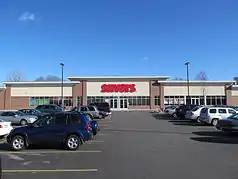Savers
Savers, Inc. headquartered in Bellevue, Washington, U.S., is a privately held for-profit thrift store chain offering second hand shopping. An international company, Savers has more than 315 locations throughout the United States, Canada, and Australia, and receives its merchandise by paying money to non-profit organizations for donated clothing and household items, and through direct donation by individuals. Savers is known as Value Village in the Pacific Northwest of the U.S. and most of Canada, and Village des Valeurs in Quebec. In Australia and other regions of the U.S., the stores share the corporation's name.
| Type | Private |
|---|---|
| Industry | Retail |
| Founded | 1954 San Francisco, California, U.S. |
| Headquarters | Bellevue, Washington, U.S. |
| Products | Second-hand clothing, footwear, bedding, furniture, jewelry, electronics, toys, and housewares |
| Website | http://www.savers.com |

Berkshire Partners bought a 50% stake in the company in 2000.[1] Freeman Spogli & Co. became the majority owner in 2006.[2] Leonard Green & Partners and TPG Capital bought out Freeman's shares in 2012.[3]
In March 2019, Savers reached a restructuring agreement to hand ownership of the company over to private equity firms Ares Management and Crescent Capital Group.[4]
Business
Savers' business model involves partnership with local non-profits and purchasing and reselling donated items. The non-profits collect and deliver donated goods to Savers, which pays them for the items at a bulk rate regardless of whether they ever make it to the sales floor. Savers has more than 160 non-profit partners throughout the United States, Canada and Australia, which it pays more than $117 million annually. As of 2012, the company had 315 stores worldwide and reached $1 billion in revenue. [5]
Items deemed resellable are displayed for purchase in stores. Savers also has a recycling program and attempts to recycle any reusable items that cannot be sold at the stores, as well as any items that do not sell over a period of time to make room for fresh merchandise. Savers has buyers for its recyclables throughout the world and attempts to keep as much donated product out of the waste stream as possible.
Business operation issues and transparency
In the United States and Canada the business model for many nonprofits was that the organization would call homes for donations, and a truck would pick them up. By the early 2000s many organizations, like the Association of Community Living, partnered with Savers/Value Village because they believed it was too expensive to do the pickups and resell to used goods merchants. Many of the contracts these organizations signed with Savers/Value Village a very small return compared to the (perceived) large amounts of money Savers/Value Village retains. According to an article that appeared in the Alberta Report in 1996 "According to the Times, for every $1.00 that went to undersigned charities from some Ellison-owned thrift stores, $2.55 went to the Ellison associates".
Controversy
In May 2015, the Minnesota Attorney General filed suit[6] claiming that the corporation was misleading the public. The Attorney General pointed out, for example, that Savers pays only a very small percentage to the non-profit charities which partner with Savers (and for items other than clothing, nothing). Additionally, the Attorney General filed suit[7] against charities that partnered with Savers, for failing to monitor Savers for compliance with their partnership contract.
In November 2019 King County Superior Court Judge Roger Rogoff ruled that the corporation had misled the public into believing the organization was a charity. This decision was primarily motivated by marketing which implied that purchases made by customers directly benefited charities when, in fact, the corporation retains all profits made from customer purchases. Penalties have not yet been determined in the case and the corporation may appeal the decision.[8]
Safety concerns
In December 2018, a family in Pitt Meadows, British Columbia, Canada reported their six-year-old son found a hypodermic needle and two partially-used tubes of glue in a used Mouse Trap board game they had bought from a Value Village in Coquitlam, British Columbia. [9][10]
In October 2019, Chris Turner reported getting a needlestick injury when he tried on a boot at a Value Village (in New Westminster, British Columbia, Canada) and was told he would need blood tests including for HIV and hepatitis.[11]
References
- Investor buys Value Village stake
- Freeman Spogli Spends $550 Million on Savers
- Freeman Passes Savers Inc. On to TPG, Leonard Green in $1.6B-Plus Deal
- Doherty, Katherine. "PE Firms Crescent, Ares Take Over Savers Thrift Chain in Restructuring". Bloomberg.com. Bloomber LP. Retrieved 28 March 2019.
- "Thrift store wars heat up with new players in St. Louis market," St. Louis Post-Dispatch, February 9, 2013.
- http://www.ag.state.mn.us/Office/PressRelease/20150521SaversLawsuit.asp
- http://www.mprnews.org/story/2015/06/08/savers-lawsuit
- https://www.seattletimes.com/business/retail/value-villages-marketing-deceived-customers-judge-rules-in-case-brought-by-washington-attorney-general/
- Agahi, Emad (December 3, 2018). "'It's incomprehensible': 6-year-old finds needle inside Value Village board game". Canada. CTV News. Retrieved April 8, 2020.
- Lazaruk, Susan (December 4, 2018). "Parents incensed after son, 6, finds syringe, toxic glue in thrift store board game". Local news. Vancouver Sun. Postmedia Network Inc. Retrieved April 8, 2020.
- Lazatin, Emily; Little, Simon (October 23, 2019). "'I just froze': Man warns others after finding syringe in boot at B.C. Value Village". Vancouver. Global News. Retrieved April 8, 2020.